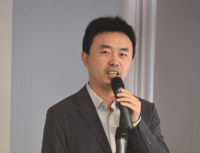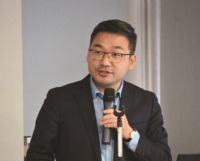The first lecture was delivered by Prof. Liu Jie, Research Fellow of the School of Education at Central China Normal University, who visited CUHK under the support of ICS Visiting Fellowship Programme. His research interests are Chinese translation history in the 20th century, the history of foreign language education, and the theory and practice of interpretation and translation. He spoke on “Forging a Critical Link at War: Chinese Military Interpreter Training during World War II”, focusing on military translators during the Second World War and exploring the cultivation of military translators under the circumstance of war.
Prof. Liu analyzed the training programme in terms of enrollment, structure, and education, and pointed out that it could be regarded as China’s first attempt to train professional translators on a large scale and in a systematic manner. Upon completion of the training programme, these interpreters went on to work in different military departments of the Chinese and the Allied Forces, contributing greatly to the victory in World War II.
The second lecture was delivered by Prof. Liu Jifeng, Associate Professor in the Research School for Southeast Asian Studies at Xiamen University, who visited CUHK under the support of CCK-APC’s Young Scholars Visiting Scheme. His research interests are the interplay of ethnicity, religion, and politics, in particular religion in Chinese societies; Southeast Asian Chinese; transnational networks; as well as ethnicity and nation building in Southeast Asia. He shared his research on “Sacralizing the Revolution: Coastal Defense Culture and the Renewal of Popular Religion in Southeast China”.
Prof. Liu introduced the Chongwu Army Temple in Fujian and the culture of folk beliefs. The temple was originally built by the local community to commemorate the 27 soldiers who sacrificed their lives in 1949, and has since been visited by locals to pay their respects. Miracle tales circulating in the community highlight the status of the soldiers, elevating them from ordinary people to deities and thereby creating a local folk belief. To gain political resources, the local government and the military also have different interpretations of the temple. Therefore, while the object of faith remains the same, civilians, the military and the local government have very different attitudes, yet they can co-exist without conflicting with each other. |














